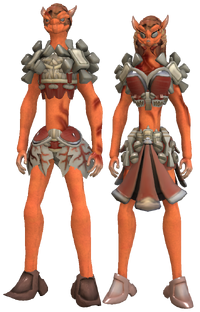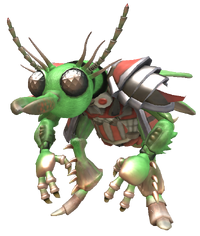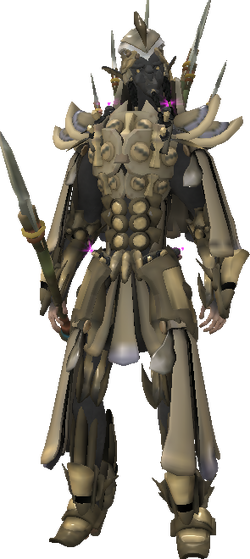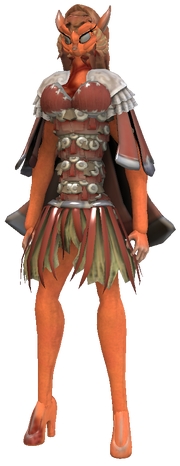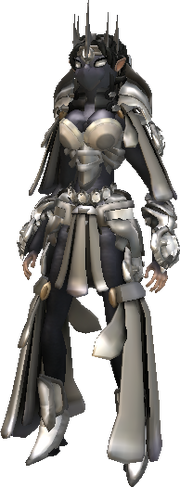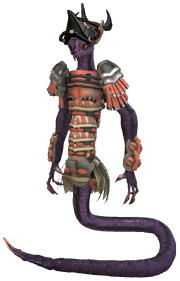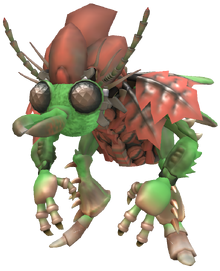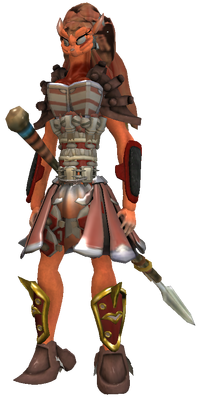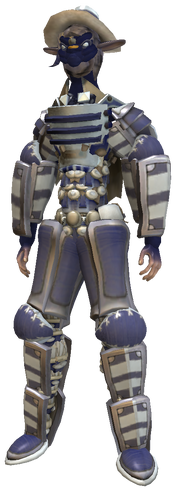|
This fiction is still under construction. Unlike {{work}}, this means that the original creator(s) of the page is still intending to finish it. |
“'”
The Sovereignty of Dryada (Old Tongue: Ordinatio Primofilios - Order of the First Children), otherwise known simply as the Sovereignty, is an archaic alliance of states and nations that resides across the world of Koldenwelt. The Sovereignty consists almost entirely of elvenkind, one of the most ancient and populous deiwes subspecies, and functions as a means of allowing communication, commercial exchange, and protection between those recognized as members of the alliance. Founded in the wake of the antitheistic crusades instigated by the extinct Adamantine Elves and the havoc caused by the gods they sought to destroy, the Sovereignty has grown and expanded to become a beneficial omen and a beacon of hope and prosperity due to those beneath its banner having mastered the arts of philosophy, tactful discussion and political connection, and the manipulation and education of the most primordial and magical aspects of the world in which they reside.
The Sovereignty of Dryada is governed by a collection of diplomatics, politicians, and national leaders from the various member-states known as the Uroboros; a council of representatives, each a diplomat of an elven society that identifies itself under the allegiance of the Sovereignty, designed to allow interaction between the member races and the leading of various specialist organizations that do not recognize themselves as a segment of any singular culture but rather as guilds and elite companies of warriors from across the lands under the Sovereignty's reign. The Sovereignty is universally known for its acceptance and tolerance of other races, with various lesser species having found solace under the flag of the Sovereignty, and its extensive history with the Empire of Man, with the Sovereignty having been integral to the foundation of the territories that construct the Empire for once, in an ancient time, the Sovereignty had held humanity as not merely a lesser race but as slaves and thralls, governed under the might of their magic, sorcery, and affinity for witchcraft.
Recognized as a potent alliance and a political superpower by those that know of it - and there are few that do not - the Sovereignty seeks to initiate an era of longlasting peace between those many primitive and advanced societies of the world and unify them to rebuild a realm without war or chaos; a world of elven ideal. Having forged many an alliance throughout its tens of thousands of years of existence, elvenkind reigns as a powerful influence throughout Koldenwelt and its realm stretches across even several corners of the world, and while trade and favours follow in their righteous path to bring forth a new age that benefits the land, many scholars, particularly those of human descent, have come to believe that the Sovereignty desires little more than to re-establish its ancient and downtrodden domain of networks, magic, and slaves.
History[]
Founding[]
Dragonrise[]
Grand Rebellion[]
Recent History[]
Characteristics[]
Elvenkind[]
“Everything has a voice; one must take the time to learn the language as we have.”
The Aitheranna, or the Northern Wood Elves, are a tall, fair-haired and pale-skinned race of elves that descend from the mountain forests of Aitheran-Loren. Possessing a resistance to all but the harshest of cold and being able to easily tame and control animals and other non-sapient creatures, the Aitheranna are considered a friendly, yet hard-working, race of people who enjoy socializing and interacting with others, although they prefer to stay away from areas of perpetual heat as they are used to the cold, frosty climate of their home, which shows in their magical aspects.
The Aitheranna are considered to be the best archers throughout the Dryadali Sovereign, able to strike foes from considerably large distances with perfect accuracy, making them valuable ranged assets to the Sanguinary Host. Their armour is designed to not effect their movement and is lightweight, thus easily-damaged, although the Aitheranna are somewhat skilled in self-defense. They are better hunters and assassins than they are soldiers and warriors, making use of animal mounts that range from the standard horses to some smaller kelodhres. Their magic revolves around both botany and cryomancy, making them somewhat unique amongst the rest of the elvish races that use the Source due to the contrasting elements.
Aitheranna are noted for their feminine and graceful appearances, both male and female. This makes identifying males of the Aitheranna difficult at first for those who have not seen them before and men are often mistaken for young women due to their long hair, their curvy bodies and lack of facial hair. Both men and women fulfill career, political and military roles, being a sexually equal culture. The Aitheranna share a belief in several deities, the most prominent being Aithengaur the Forest Father.
“The Highpeaks sing to us.”
The easternmost elven tribe, the Tamaraul (also known as the Sky Elves), are arguably the most militant people of the Sovereign. Descendants of wood elf settlers from the Western Forests, these grey-skinned, golden-eyed highlanders inhabit the Biennsar Ridge, an ancient and magical mountain chain which stands at the border between the Great Desert and the Eastern Plains. The geographical position of their home puts them between the lands of different species, such as the Merovar, the Klaxxa and the twin human kingdoms of l'Ammanori and Alhassal; as such, the Tamaraul as a culture have always been among other elf races as both warriors and traders.
The keystone of the Tamaraul culture is the magic of the Highpeaks, the oldest mountains in the Biennsar Ridge which have accumulated great amounts of Source energy over time (human scholars and Klaxxa scientists believe that they serve as a nexus for several ley lines, but this theory remains unconfirmed) in their blessed waters. The relationship between the mountains and the elves is reciprocal. The Highpeaks give Tamarauli extended lifespan, strength and magic to tame the many beasts that inhabit Biennsar, the legendary Bagraat giant eagles in particular, while the Tamarauli warriors revere their home, worship it and join its collective consciousness upon death, thus perpetuating the endless cycle that has existed for millenia. The highlanders are willing to share their magics, and will often sell artifacts anointed in Highpeak waters to humans or Merovar in exchange for rare wares, fabrics and metals for their forges, as long as their customers don't abuse the power given to them or use them against Biennsar.
In case they do, however, the Tamaraul respond swiftly and mercilessly. Every highlander, man or woman, studies swordsmanship and Bagraat riding from an early age; if need be, the entire population of Biennsar may be raised to war and sent to protect the Highpeaks. Fierce and vicious in combat, Tamaraul sky riders are among the most feared elven warriors on Koldenwelt, swooping into enemy positions and then ripping their foes apart with their flying steeds' mighty claws. Other people of the Sovereign dismiss their highlander cousins as barbaric and violent, but ultimately admit and respect their prowess in battle; as such, Tamaraul cavalrymen are a common sight in the Sanguinary Host.
“Other elves have their fancy elements. Us? We simply are, and we're okay with that.”
The Adsiduus, most known as Modest Elves, Arcane Elves or Plain Elves are a race of tall elves descendants of slaves of the Deiwos known as Adamantine Elves. The Modest Elves mostly lived at the West before many of their kind were moved to the East, and this slavery lasted for several thousand years until the Adamantine Elves' society collapsed due to their experiments with adamantine and the Source and their continuous confronting of beings such as the Colossi and Simulacra.
During the downfall of their masters, the Adsiduus Elves rebelled and uprisings began all over their original territories, where the Modest Elves waged war on their slavers under the leadership of a legendary elven swordsman known as Adsirduhann the Reclaimer, who reclaimed the old territories of the Adsiduus' ancestors and was vital for the downfall of the Adamantine Elf civilization. To honour their hero, the Elves took Adsirduhann's name as their own, and once they obtained their freedom, they joined with the first Dryadali Sovereign, where they have grown and greatly expanded both in numbers and culturally.
Modest Elves, despite having this nomenclature, are not necessarily modest. The Adsiduus are described as not having a set behaviour, with each individual having their own personality and behaviour varying greatly from one individual to another. There are as many genuinely friendly and modest Adsiduus as there are aggressive, snobbish and egotistic Adsiduus. Despite all variation, some parts of their culture are consistent with most individuals, including a love for nature and a great interest in magic.
“Our hearts are literally ablaze with life. To let such a flame die out without enjoying it to its fullest would be an insult.”
The Erylia, most known as Fire Elves, are a race of tall elves hailing from the land of Erylianus, a plateau range surrounding an active volcano located in the Eastern Plains, located north to Ar-Klith. Their title of fire elves is blatant due to their physical appearance, possessing long hair which can literally burst into flames according to the elf's will or emotional state. All Erylia possess a "scar" in the form of a darkened skin colour on their torsos, which is said to represent the wrath of the land upon each volcanic eruption.
The Fire Elves are a highly cultured people, famous across the Sovereign for their optimistic view of nature and their music. Erylia dancers are popular as a form of entertainment. The race is often said to be hot-blooded and easily bored unless occupied with something, with their men being courageous and determinate warriors, and their women being seductive and sassy. As a whole, the Erylia are welcoming and enjoy the company of other races, especially other elves who may make them company.
As their names imply, they solely use fire magic, being capable to enchant weapons with flames or launch fireballs from their hands. Fire Elf soldiers are equally capable of being warriors and mages, though their archery skills are overall poorer than those of other elves. The Erylia's hot-blooded nature makes them somewhat easier to anger than other elves, and if they become to stressed, they may lose control of their flames and cause accidental fires. Regarding religion, the Erylia have grown to adopt the Isir'ialveium pantheon, as they have no deities of their own.
“We safeguard the Sovereign from the hordes of the East. Shall we fail, the barbarians will sweep away the entirety of our civilisation; it is our duty to keep them at bay.”
A small but nevertheless prominent nation of elves that inhabits the Forlorn Peninsula north of the Frontier, the Vila, also known as the Twilight Elves, are often called "the Sovereign's Shield". Aristocratic, proud, even arrogant at times, these crepuscular beings who live in a place where nights and days are long and unforgiving were unfortunate enough to have settled close to the domains of the Empire of Man, which grew to become the elves' greatest enemy. Now all Vila stand on a never-ending vigil, always ready to crush the savages from the East should they desire to wage war upon the Sovereign.
Both among elves and humans, the Vila are often seen as a mysterious, duplicitous people. Masters of shadow magic and devoted followers of Aethereus, the Colossus of Darkness, they always hide behind illusions and glamours, using subterfuge and deception to battle the single-minded hatred of the Empire. Their diplomats were behind the alliances that brought down the First Imperial Crusade in Tartarion and their warriors were behind the assassination of the first ruler of the Empire, Ermenrich of Mannazia. Showing one's true emotions or even revealing one's face in public is taboo by Vila law: as such their nobles often wear elaborate masks so that their expressions are never seen by outsiders. Their seeming coldness however belies a highly hedonistic culture: although reserved, Vila also value pleasure greatly, provided that it does not interfere with their many schemes and plans.
The Vila Realm is an aristocratic monarchy; it comprises hundreds, if not thousands of various noble houses, all vying for dominance. Minor families compete for prestige and respect, while the richest and the most influential of them, usually those in control of powerful sources of magic or valuable information, fight for the crown of the Grand Duke, the ultimate ruler of the Realm elected by the council of nobles. Because of constant plots, schemes and fragile alliances, Vila politics may seem extremely convoluted and opaque to the outsider - exactly how they should be.
“The Sssovereign isss the one place where we found a home, for the world ssshuned usss like beassstsss, all because of that cursssed Colosssusss' actionsss.”
The Khalmartia, most known as Venom Elves, are a race of tall elves hailing from the land of Qliphoth who were pushed away from their home by the minotaurs known as Oevrumine a long time ago. To survive, the Khalmartia migrated into the Polar Lands, where they took residence at northwest and built their new capital of Mosocia. Positive interactions with the Dryadali Sovereign, one of the only empires to feel sympathy for them, resulted in great part of the Khalmartia joining the elven dominion 12,000 years before the New Age until a disaster happened in their lands.
The Poison Colossus Xitannoth, in a fit of sadism, used his magic to heavily disfigurate the Khalmartia, turning them into scaled, snake-like beings. Now been seen as monsters by most of the world, great part of the Venom Elves secluded themselves further northwest while only a small part of them remained at the Sovereign, where they are now seen with distrust by other elves.
Because of their mutated appearance, Khalmartia are shy and reserved elves who prefer to keep to themselves rather than interact with large numbers of people. The Khalmartia still living at the Sovereign have become apprehensive of outsiders and have grown to keep their concerns to themselves for not wishing to burden their allies with them. Culture-wise, the Khalmartia are a deeply spiritual people with a great affinity to poisonous snakes, including the mighty basilisks, and all of them hold a deep hatred for Xitannoth for mutating them and would stop at nothing to see him destroyed. The Khalmartia notably have an aversion of water, with many of them displaying traits of Thalassophobia.
Foederati[]
“The Sovereign will remain safe as long as we remain standing!”
The Niaka are a race of very small, very fragile and short-tempered insectoid creatures and one of the Dryadali Sovereign's client species. Natives of the Eastern Plains, the Niaka notably possess tremendous magic potential for creatures of their size. In comparasion, their physical strength is mediocre, to the point a Smeever can kill one by jumping on it.
Being the least physically adept species on Koldenwelt, the Niaka have used their magic to create golem-like suits of armor made out of rocks, which they use to fight and work. The Niaka themselves hide inside these golems with only a space for eyes visible, making them almost totally defended from attacks. The golems' durability depends of the rocks they were created from, and though the Niaka can keep them active for long periods, continuous damage to them leaves the Niaka weakened and exhausted.
The Niaka joined the Sovereign looking for protection from the Sea of Sand's Wranploer, who were invading their lands and taking advantage of their weak physique to loot their lands. Since joining the Sovereign, the Niaka have adopted the role of guards for Sovereign cities as a way of thanking them for their aid. The Niaka have learned to respect the elven pantheon of gods, though they still hold their original gods, Xerkea the Chief-Queen and Xoraika the Chief-King, in very high regard.
Organizations[]
Civic Guard[]
“'”
The Civic Guard (Old Tongue: Praefectum Aurorum - Wardens of Gold) is the terrestrial military branch of the Sovereignty of Dryada and instead of being commanded by any single participant of the alliance, the Civic Guard was founded, organized, and is currently governed by the Uroboros as an international armed forces organization that encompasses the members of elvenkind that are aligned with - or a part of - the Sovereignty. Designed and structured to defend territories of the Sovereignty, such as its own capital, and provide support to individual nation-states should they find their own standing armies insufficient in the face of threat - although such occurences are uncommon according to the historical records of combat and warfare stored within the libraries and documents of the Sovereignty. The Civic Guard allows all members of elvenkind within its ranks and retains a firm policy of remaining neutral regarding the affairs between states, with soldiers and warriors, as well as administrators and commanders, of the Civic Guard abandoning any national identity other than their affiliation to the Sovereignty as a whole entity, their personal loyalties tied to Uroboros.
Training within the Civic Guard consists of a great number of rigorous physical and psychological examinations and intellectual studies, with each soldier of the Civic Guard a trained and capable individual that not only can effectively comprehend and understand the tactics and stratagems of frontline confrontation while handling a variety of both conventional and exotic weaponry and magics, but can also recite at least the most major and significant events of the history of the Sovereignty in detail; even the lowliest of the Civic Guard roughly equates to an officer of any other elven standing army in terms of intellectual and combat experience. The warriors of the Civic Guard are recognized by their enchanted, 'golden' armour and weaponry - the only army of the Sovereignty allowed to sport such, including the otherwise standard militaries and armed forces of the participants and supporters of the Sovereignty's cause, although the material used to construct Civic Guard armour is not actually gold - and maintain a hierarchy of its own, with its more administrative and commanding positions fulfilled by individuals selected by input from the politicians within the Uroboros itself;
- Guardian (Gladior) - A standard footsoldier of the Civic Guard; is often equipped with basic weaponry, such as spears, pikes, swords and bows, and armour, such as medium or light armour. They are usually organized into squads of six-to-twelve soldiers under the guidance of an Enforcer and serve multifunctional roles on the battlefield, from frontline melee assault to ranged support and all methods of combat in between.
- Enforcer (Vigilor) - A sergeant of the Civic Guard; is usually attached to squads of Guardians in order to guide them through the course of a battle and has access to a variety of weaponry, such as halberds, axes, greatswords or crossbows, and armour, such as medium or heavy armour. Enforcers are highly respected members of their teams and often act as fatherly figures to their men, and are expected to cooperate with other Enforcers and their respective squads should the need arise.
- Talon (Raptor) - A specialist rank of the Civic Guard; is usually equipped with enchanted armour given the capacity for flight, usually medium armour although is often considered to weigh as much as light armour, and are granted access to light-to-moderately weighted weaponry, such as halberds, axes, longswords and bows. They are widely considered fast-attack and scout units and are organized into squads of ten-to-twenty soldiers under a Talon Enforcer.
- Safeguard (Aegisor) - A specialist rank of the Civic Guard; is usually equipped with enchanted armour given the capacity for extraordinary durability, usually heavy or super-heavy armour, and are granted access to moderate-to-heavy weighted weaponry, such as greataxes, broadswords and greatswords, as well as thick, dense enchanted tower shields. They are organized into squads of five-to-fifteen soldiers under a Safeguard Enforcer.
- Rider (Equesor) - A specialist rank of the Civic Guard; is usually equipped with medium armour and are granted access to weaponry such as lances, pikes, crossbows, spears, halberds and bows, and are also allowed a terrestrial mount to ride upon into battle, often horses. They are largely considered cavalry units and are organized into squads of twenty-to-forty soldiers, guided and commanded under a Rider Enforcer.
- Adept (Tribunor) - An administrative rank within the Civic Guard; is in charge of Civil Guard military activities within cities, towns and districts, and will often be in charge of formulating preparations for mobilisation against opposition, whether such should be defensive or offensive. There is at least one Adept in charge of an assigned location and many Adepts will be drawn from the ranks of the Enforcers, while some are requested and inducted from the ranks of the standing armies outside of the Uroboros' direction, such as national militaries. They are allowed access to whatever equipment and magic they hold a preference towards.
- High Adept (Praeceptor) - The highest rank within the Civic Guard; is in charge of following the activities of various Adepts throughout several assigned locations and territories under the Sovereignty's recognition and are considered the magnum opus of the Civic Guard's martial power, for they are often one-warrior armies in their own right due to experience accumulated over the course of their service. There are less than a dozen High Adepts while one and one exclusively, the Lord Adept, maintains a seat upon the Uroboros to communicate and relay information from the politicians to the personnel of the Civic Guard.
Civic Armada[]
Guilds of Paradigm[]
Government[]
The government of the Dryadali Sovereign is an oligarchial board of individuals; a small council consisting of racial leaders and representatives of organizations associated under the Sovereign. The methods of election for each racial leader is exclusive to their cultural tradition and society, while organized representatives are often selected by established members of Uroboros - the highest political power. Uroboros employs diplomatic representatives of the Sovereign to establish alliances and trade routes with outside powers and uses territorial governors, known within the Sovereign as Presiders, to ensure internal stability between races and locations as well as prepare their assigned peoples for situations and events.
Uroboros[]
Society[]
The Dryadali Sovereign's society depicts co-operation and diversity as its base philosophies; formalization is uncommon among the Sovereign as many believe such promotes conversion and imperialism as well as places one at a disadvantage through disregarding their individual skills and talents. A cosmopolitan nation the Sovereign admires cultural, religious, and physiological complexity and openly encourage such within and outside of their borders, with many Sovereign researchers willing to expose themselves to foreign traditions and culture in order to gain experience and attempt understanding. There is a wide degree of religious freedom within the Sovereign, with minor, unofficial churches dedicated to the Adversary being found throughout certain small parts of the Sovereign as a testement to their cosmopolitan lifestyle although there is a common agreement between religious groups that there is to be no conflict over belief and as such certain practices usually associated with such religions are outlawed.
Career opportunities and political influence are available for all official members of the Sovereign, including women although some individual cultures within the Sovereign prevent women from assuming paid jobs while others dictate that it is only the woman who should work while the man stays at home and does otherwise 'womanly' duties. While the laws of the Sovereign apply to all, and even then possess certain specifications and conditions regarding race and gender, punishments are ultimately carried out as a criminal's culture dictates unless stated otherwise, with punishments including both imprisonment and execution. Education centers such as schools and colleges are designed to teach multiculture as well as encompass a large variety of traditions found inside and outside of the Sovereign, although many are universally more directed towards the schools of Source and metaphysical concept rather than science and technological progression.
Nature serves a vital importance within the Dryadali Sovereign; collectively the Sovereign discourages the harming of nature and thus when they construct settlements and cities they often replant seeds in order to regrow trees or allow the native fauna to survive under their protection. Cities are often engraved into mountain faces or allow for forests to exist within their walls. Permanent damage to the properties of nature, such as large-scale industrialism, is considered heinous and immensely disrespectful as many elvish cultures of the Sovereign recognize nature as their ultimate origins as well as their home, with some even going so far as to claim that Koldenwelt possesses its own spirit and the surface is its body. Domestication of animals is surprisingly uncommon, with a preferred method of bestial interaction involving bonding and mutual relationships rather than outright domestication and captive breeding, meaning animals continue to stay wild and stay attune to their instincts.
The Dryadali is openly welcoming and encouraging of foreign bodies, both deiwes and nondeiwes, and largely believe that peace, or at least tolerance, between Koldenwelt's races can be achieved in order to attain a global and racial prosperity. The Sovereign has established trade routes with many neighbouring civilizations and within itself so territories can exchange resources and assets between one another, with the Sovereign also possessing small dedicated security forces assigned to their foreign allies and vice versa. Deiwes such as elves are not the only demographic of the Sovereign, despite being undoubtedly the largest, as there are a great deal of client races who have taken residence under the Sovereign, working careers or serving within the military in order to contribute to the nation and earn their keep.
There is no standardized form of currency within the Dryadali Sovereign - certain territories and races have their own methods of payment although universally exchange of produce and labour are considered the primary forms of payment, with favours being a close second. Settlements are often self-sufficient that use various methods of election in order to decide their leaders, although the most common forms are democracy and meritocracy. Entertainment ranges between ethnicities and races and very rarely is a practice of entertainment outlawed, with lax laws and regulations proving to be a cause of this.
Language[]
Dryadilic Lexicon[]
Languages within the Dryadali Sovereign are as diverse as the races that use them, with a large variety of vocal and written forms being presently used among the people of the Sovereign. Texts and tomes are often translated between elvish authors so that a variety of ethnicities can read them coherently although many schools and academies within the Sovereign teach multiple languages, including languages not officially used within the Sovereign such as collective Imperial standard, and some offer advanced courses as additional studies, allowing an educated civilian of the Dryadali Sovereign to be able to speak and understand at least a minimum of three languages coherently both in terms of text and in terms of speech.
Some languages have been hybridized and bastardized between certain ethnicities, with some native languages having been lost throughout the ages and replaced with fusions. As such a particular amount of elvish races speak languages that follow similar patterns to one another or share certain aspects that can be traced to languages used by their ancestors. In terms of standardized language, the Sovereign primarily uses two forms; New Common, which has become widely accepted as a collective standard language between many races and nations on Koldenwelt, and Dryadali Basic, a language so bastardized that a majority of elves are capable of speaking such without much need for advanced education. Between elvish races Dryadali Basic is often used although New Common is used to communicate with foreign races, such as client species and political enemies and allies although some take up the courtesy of learning Dryadali Basic in respect to the Sovereign.
Religion[]
There is a wide degree of religious freedom within the Dryadali Sovereign, with many churches and faith organizations devoted to a wide variety of beliefs, deities, and philosophies having been established and popularized throughout the Sovereign's territories and lifespans. Worship and dedication to nature and deities are not uncommon forms of belief, with some elves not even devoting themselves to worship and instead exchanging belief for philosophy and atheism not being a rare case. Religions have since been expanded upon and evolved throughout the Sovereign's history and a great deal of religions possess multiracial followers from all across the Sovereign, although several are still racially exclusive, especially among the client races which often support religious systems unaffiliated to any pre-established elvish belief.
Religiously-guided elvish races are known to possess a seat of political influence, with certain individuals holding a place within the Ouroboros Circle, and have been known to associate their actions and decisions depending on their deities and philosophies, although many religious leaders are more open to the idea of democracy and diplomacy and as such the people would have more of a say than pre-Sovereign membership. However, religions can still influence racially-exclusive traditions such as gender inequality, rituals, mandatory military service, and various other circumstances depending on one's culture and background. Religions are also known to be modified in order to appease the laws of the Sovereign, as such most forms of ritual sacrifice are prohibited unless such is voluntary.
Alongside the Isir'ialveium pantheon, by far the most common religious belief among the elvish races, modified and regulated worship to the Adversary is not unheard of and is in fact existent among a small demographic of individuals throughout very exclusive parts of the Sovereign's territory. All official churches, including those in dedication to the Adversary, are under the agreement that religious conflict is prohibited and mutual tolerance and respect between its heads, representatives and followers must be maintained at all times in order to strive for a fair society.
Magic[]
The Source is considered to be a metaphysical essence that can be applied in a variety of ways by many members of the Dryadali Sovereign, with schools and academies having been established in regard towards the studying and application of magic in society. While most individuals of the Sovereign are capable of exploiting the Source, there is surprisingly a moderate demographic which actually apply it outside of the Crimson Order which isn't entirely surprising as the Source is considered by some to be a rather dangerous essence to attempt to manipulate for both users and those around them. The Source is not so much feared as it is revered, with the treatment of magic and alchemy being handled by professed individuals such as trained soldiers and metaphysical scientists and philosophers.
Magic is one of the few subjects of the Sovereign that is officially formalized, with divisions of magic being separated into classifications and specialisations, with grades issued to all types in regard to their capabilities in their table of usage. Many Sovereign texts describe magic as being a beneficial asset but is to be treated and handled with care and used efficiently and appropriately, and as such offensive-grade magics are often only taught within the military and to particular politicians in order to defend themselves. Alchemy and arcanisation are also areas of practice involving magic within the Sovereign, with many higher-ranking and influential figures possessing their own arcanised or enchanted weapons and armour. Misusage of magic and the Source can lead to severe consequences and thus many individuals choose not to use it outside of combat in fear of accidental incidents.
Technology[]
Territories[]
Individuals[]
“A hero once. A tyrant now. How doth vanity take corruption in a man so swift?”
- - Iudeili the Golden Tongue, famous elven poet and musician. Ended his life being dipped in liquid gold and subsequently turned into a statue in the Archon's palace.
- Name: Suraxmali I
- Position: High Archon
- People: Tamaraul
- Age: 132 at the time of death
When the ancient dragon Yurizeng-long arose in the east with a desire to dominate the world for his god 1,000 years ago and brought with him the innumerable legions of Kelodhros of all kinds, it was Suraxmali that rallied the Sovereign to stand against him. One of the greatest eagle riders the peaks of Biennsar has ever seen, one with his loyal eagle, Erzi, he quickly rose into prominence as the Dragonrise raged across the lands of the Sovereign, his bravery, courage, bloodthirst and ruthlessness having made him a worthy opponent for the draconic horde. His bloody victories earned him respect from his peers, leading the Ouroboros Circle to appoint him High Archon of the Sanguinary Host. Suraxmali quickly proved himself worthy of the title and was universally praised as a brilliant commander - although most of his victories are attributed more to his willingness to sacrifice his soldiers - especially the human slaves, whom he despised - than to his strategies. Never caring for his own life, he cared even less so for the others.
Neverthless, to the cowed people of the Sovereign, Suraxmali was a hero, and as the war went on and the people became more and more desperate, his power grew to the point that his authority came to overrule the Ouroboros itself. Eventually, Yurizeng-long's horde was broken by the elven armies as the High Archon defeated the ancient dragon by trickery - leading a batallion of human slave soldiers for him to slaughter in order to bait him to the fire of elven ballistae. As Suraxmali fought Yurizeng in the sky, the magical bolts brought him down and the gigantic dragon fell on the ground of the Eastern Plains. The duty the Tamaraul warlord had been given by the people of the Sovereign was complete.
However, blinded by his pride, Suraxmali did not intend to relinquish his power. Still an adored public figure despite his growing insanity, he sought to expand the Sovereign to please his own ego, claiming vast territories in the East that now belong to the Empire of Man. The place of Yurizeng's final demise became the foundation of the Archon's new shining capital, Argent Corona, whose every street bristled with monuments depicting his victories - and the bleeding corpses of those who would dare to challenge his rule. Many more cities like that were in planning, and their construction as well as the East's colonisation was of course done by the inferior Men - already dissatisfied greatly with their position at the bottom of the society. Dissent sparked a revolution. In but a few decades - a long time for a human, perhaps, but meager for an elf - the slaves rose against their masters spurred by the Archon's mad ambitions, and, aided by those more sensible and noble among the Dryadali, brought down Suraxmali's reign once and for all. To this day his name is spoken with contempt and scorn among both races, and it was his actions that led the elves to become the egalitarian society they are now.
“All I wish for is for the prosperity of the Sovereign and her children.”
- Name: Kassina Tefrignatus
- Position: Member of the Uroboros
- People: Erylia
- Age: 115
Kassina Tefrignatus is the Fire Lady of the Erylia Elves and serves as their leader in the Dryadali Sovereign. A tall, beautiful woman by elven standards, Kassina was born at 155 BNA as the youngest daughter of the previous Fire Lord. She succeeded her father as the leader of the fire elves after a disaster involving him being mauled to death by a Fire Drake, this giving Kassina a traumatic fear of True Dragons. As a member of the board of Uroboros, Kassina is actually against the hierarchic organization of the Sovereign, believing it to be unfair toward poorer citizens who have no say on the rich class's actions. Her fear of dragons has tempted her to act against the Wyvernrider Legion in the past, but the Assembly's multiple accomplishments through the years have caused her to accept that it was a fundamental part of her people's society.
“I believe all have a chance to redeem themselves of any crime, sans very few exceptions. I want to see the Sovereign prosper through peace and not conquest.”
- Name - Cassala Petalbright
- Position: Member of the Uroboros
- People: Adsiduus
- Age: 642
Cassala Petalbright is the Earl of the Adsiduus Elves and serves as their leader in the Dryadali Sovereign. The oldest daughter of her family, she took over as leader of the Modest Elves at the age of 42 and has been reigning ever since, rulling for almost 600 years. As a member of the board of Uroboros, Cassala is noted for her outgoing behaviour and her great sense of empathy, usually voting against outright declaring war on other factions. Because of their similar personalities, Cassala is a close friend of the Fire Lady of the Erylia, Kassina Tefrignatus.
“With all due respect to the Uroboros and the bubble they reside in, I believe that the perspective gained from observing the Empire from thousands of leagues away belies the seriousness of the situation here in the Orient. The Eastern savages need to be reminded of their place.”
- Name - Lucretia Marzana
- Position: Member of the Uroboros
- People: Vila
- Age: 1,898
The Vila elves have many barons and dukes, jarls and counts, but all bow to one: lady Lucretia Marzana, Grand Duchess of the Forlorn Peninsula. Having deposed - through an "accident", as per Vila tradition - her older brother after his desire to find new magic sources for his people after the etherfonts of the Mana Glades were depleted alienated the rest of the Sovereign from him, she was the one that led her people through an exodus into the East, and has been ruling over her people since then. Thanks to her liberal use of rejuvenation potions, temporal magic, and, as some claim, certain forbidden arts, she has lived for over a millenium already, and is still nostalgic of the times when the grass was greener, the Mana Glades were fertile and the humans served elves loyally. Lucretia certainly does not let her advanced age stop her, though: her legendary beauty is still perfectly preserved - she is one of the few Vila who does not wear masks - and she enjoys the luxuries of her status to the fullest, a well-known libertine and a fervent follower of Kalisearan. She is known to have many lovers in the Sovereign and beyond, men and women, elves and humans (some say that not even Kelodhros and Theriocephali are safe from her, but these are likely exaggerations).
Lucretia is far more than just an idle hedonist, though. Beneath the Grand Duchess' beautiful exterior lies a sharp, ruthless mind of a cunning manipulator and over eighteen centuries of experience. She thrives where political intrigue is rife; not even the other members of the Uroboros feel exactly safe when she is nearby. Poisons, daggers, cursed amulets, slander and blackmail are the weapons she wields with finnese and precisions, and even her lust can be used against her enemies: some say that the very lipstick she uses is toxic. With the Empire's recent expansion, and Lucretia's hatred for it that she shares with the rest of her people, many in the Sovereign now fear that the Grand Duchess, not content with the Sovereign's current external politics, may decide to take a few steps to coerce the Ouroboros Circle to act...
“We are not monssstersss!”
- Name: Nedrait Polluvie
- Position: Member of the Uroboros
- People: Khalmartia
- Age: 261
Nedrait Polluvie is the current Venomarch, the leader of the Khalmartia Elves within the Dryadali Sovereign. One of the oldest and most powerful living Venom Elves, Nedrait was appointed to be Venomarch following the disappearance of his predecessor. His advanced age and mastery of venomancy has given him the ability to control basilisks, something few Khalmartia can achieve in their lifetimes. As a member of the board of Uroboros, Nedrait does what he can to prove his fellow elven leaders that his race is not evil, and makes efforts to "rescue" Khalmartia who are not currently members of the Sovereign. He also urges the rest of the Sovereign to invade Qliphoth and wipe out the Oevrumine in an attempt to gain control over the Venom Elves' former lands, but due to Qliphoth's hostile environment, his requests are left ignored.
“Ah yes. You are a threat. I will now dismiss you as my soldiers beat you to a pulp.”
- Name: Xeron
- Position: Leader of the Niaka
- People: Niaka
- Age: 47
Xeron is the current Chief of the Niaka and their leader within the Dryadali Sovereign. A former soldier of the Niaka military, Xeron fought the enemies of the Sovereign, including the desert-dwelling Wranploer, for three decades until he was chosen to be the new Chief for his multiple accomplishments. Xeron is a condensing and rather unpleasant individual who makes full use of his position of power to obtain what he wants, though he is still at the mercy of the Uroboros and has no control over elven politics. Despite being seen as unpleasant by most, Xeron genuinely cares for the Sovereign and makes his best efforts to keep the Niaka as an efficient member of its society.
“To the skies, brothers and sisters!”
- Name - Filonan Aerember
- Position: Wyvernlady
- People: Erylia
- Age: 31
Filonan Aerember is the current leader of the Wyvernrider Legion of the Dryadali Sovereign. A battle-hardened woman who aspired to be a wyvernrider since her youth, Filonan joined the Assembly at the age of 17 and made herself famous for her skill and her taming of one of the Legion's most stubborn wyverns. Becoming the leader of the Legion after unmasking and defeating the vampire who served as the previous leader, Filonan is a fierce warrior who made herself known as an heroine for her victories against the fascist humans and the forces of the Exosubstratal.
“You'll all care for the vampire threat once they start pouring into our cities and devouring our men.”
- Name - Yurthez Bertonius
- Position: Fangbane Leader
- People: Derevar
- Age: 386
Yurthez Bertonius is the current leader of the Fangbane Guild of the Dryadali Sovereign and the last living member of the Bertonius Clan, a family of Derevar Elves who once had the possession of the legendary demon-slaying weapon known as the Vanius Whip. Having fought vampires for over 360 years, Yurthez has made himself known as one of the best vampire hunters of Koldenwelt and as one of the feared figures for vampires and werebeasts alike. Having lost his family during his early adulthood, Yurthez has an undying hatred for all vampires and vows to bring an end to the Nightshade Clan no matter the cost. Armed with a silver-barbed whip, knives, axes, holy water and pure skill, Yurthez is not to be underestimated, for the citizens of the Sovereign even fear his presence and ruthlessness. And they have a reason to do so.
Relations[]
Allies[]
![]() “A single voice shan't usher a new era. A great many voices - your voices - are required to sing praise to bring forth an age within which all voices - ours and others - can rightfully prosper.”
“A single voice shan't usher a new era. A great many voices - your voices - are required to sing praise to bring forth an age within which all voices - ours and others - can rightfully prosper.”
Neutral[]
![]() “Not only do those misbegotten souls of the world rely upon our strength to guide them; we rely on others to guide our strength.”
“Not only do those misbegotten souls of the world rely upon our strength to guide them; we rely on others to guide our strength.”
Disliked[]
![]() “While the quills that write the words of harmony remain upon paper and parchment all the same, our swords remain drawn from their sheaths and the essence of the world flowing between our very fingertips.”
“While the quills that write the words of harmony remain upon paper and parchment all the same, our swords remain drawn from their sheaths and the essence of the world flowing between our very fingertips.”
Enemies[]
![]() “The songs of war and triumph require music most appropriate; the dying screams and last breaths of life of those that wish to halt the coming of the new era shall suffice nicely to the ears of elvenkind.”
“The songs of war and triumph require music most appropriate; the dying screams and last breaths of life of those that wish to halt the coming of the new era shall suffice nicely to the ears of elvenkind.”



